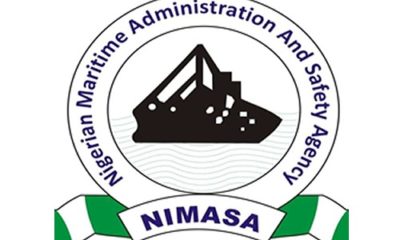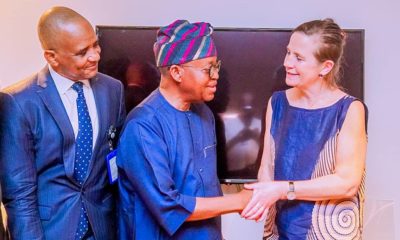Business
CAPACITY BUILDING: NIMASA RENEWS MoU WITH WORLD MARITIME UNIVERSITY
By Lucky MOMOH
- To Set Up Regional Maritime Safety and Security Research Center
- We Are Delighted to be Associated with NIMASA – WMU President
The Nigerian Maritime Administration and Safety Agency (NIMASA), has renewed its Memorandum of Understanding (MoU), with the World Maritime University, (WMU) Malmo, Sweden. The move is aimed at enhancing capacity development; to grow the Nigerian maritime sector.
Speaking shortly after the signing of the MoU virtually, the Director General of the Agency, Dr. Bashir Jamoh noted that there is no substitute to education. “The Collaboration with the World Maritime University by NIMASA is to advance maritime interest while addressing the changing needs of the maritime industry based on sustainable capacity development; as education, training and capacity building play a major role in developing shipping in any nation”, he said.
Dr. Jamoh used the opportunity to disclose that the Agency is at an advanced stage in setting up a Regional Maritime Safety and Security Research Center to enhance research works. The centre is to take care of capacity development in 25 African countries. “Graduates from the WMU who are in the employ of the Agency will serve as Researchers and Resource Persons, Sharing knowledge and hopefully develop a research based sustainable framework to provide solution to issues of insecurity in the Gulf of Guinea.
The NIMASA Regional Maritime Safety and Security Research Center will be a center of excellence in research and we will collaborate and cooperate with other countries”.
On her part, the President of the WMU, Dr. Cleopatra Doumbia-Henry noted that NIMASA is playing a leading role in developing capacity for the maritime industry in the Gulf of Guinea region. She commended Nigerian students who have passed through the University, welcomed the agreement and added that NIMASA is one of the first supporters of WMU. Accordingly, she stated that the initiative also supports the WMU’s commitment to the UN Sustainable Development Goals (SDGs).
“Nigeria leads, others follow. WMU is delighted to be associated with NIMASA and its work which extends beyond national boundaries, and has a significant effect on the whole region. We are also pleased to have such a successful and warm relationship with NIMASA and its staff – it is a perfect example of international cooperation for sustainable growth. I look forward to the fruitful outcome of our collaborative efforts as articulated in the Memorandum and based on the principles of equity, reciprocity and mutual benefit.”
The agreement provides for maritime education, training, research and capacity building for officers of NIMASA with at least ten officers funded annually by the Agency to study at WMU in the MSc in Maritime Affairs programme based in Malmo, Sweden. In addition, under the Agreement, NIMASA will sponsor at least one officer per year to study in the WMU/IMLI MPhil programme in International Maritime Law and Ocean Policy. The agreement also provides for WMU to develop and organize short-term, specialized Executive Professional Development Courses (EPDCs) for NIMASA officers.
Osagie Edward
Assistant Director, Public Relations,
NIMASA
Business
SERAP Takes Legal Action Against FG Over 50% Telecom Tariff Hike

The Socio-Economic Rights and Accountability Project (SERAP) has taken legal action against the Federal Government of Nigeria (FGN) on what it termed “the arbitrary, unconstitutional, unlawful, unfair, and unreasonable 50 percent telecom tariff hike by the Nigerian Communications Commission (NCC).”
Biztellers reports that the NCC was joined in the suit as Defendant.
Recall that the NCC recently approved a 50 percent hike in telecom tariffs, which by implication would see the average price of calls will rise to N16.5 per minute from N11; the cost of 1GB of data to N431.25 from N287.5/GB; and SMS rates to N6 from N4.
ALSO READ: Super Eagles Await Group Stage Fate As AFCON Draw Holds In Morocco
In the suit number FHC/ABJ/CS/111/2025 filed last Friday at the Federal High Court, Abuja, the SERAP is asking the court to determine “whether the unilateral decision by the NCC to authorise telcos to hike telecom tariffs by 50 percent is not arbitrary, unconstitutional, unlawful, unfair, unreasonable and inconsistent with citizens’ freedom of expression and access to information.”
In addition, the SERAP is asking the court for “a declaration that the unilateral decision by the NCC to authorise telcos to hike telecom tariff by 50 percent is arbitrary, unfair, unreasonable and inconsistent and incompatible with citizens’ freedom of expression and access to information, and therefore unconstitutional and unlawful.”
The SERAP is also seeking “an order of interim injunction restraining the NCC, its officers, agents, privies, assigns, or any other person or persons acting on its instructions from further implementing, enforcing and doing any act to give effect to the decision of the NCC authorizing telecom tariff hike by 50 percent.”
In the suit, the SERAP is arguing that: “The legal and constitutional provisions as well as international standards on freedom of expression and access to information constitute the repository of legality. The requirements of legality constrain the exercise of statutory powers by the NCC to authorise any increase in telecom tariffs.”
The suit filed on behalf of the SERAP by its lawyer Ebun-Olu Adegboruwa, SAN, read in part: “The demands of legality impose clear duties of fairness and reasonableness on the NCC in the exercise of its powers to authorize the telecom tariff hike by 50 percent, which is the subject-matter of this suit.
“The NCC is required under the legal provisions on consumers’ rights and constitutional and international standards on freedom of expression and access to information to base its decision on reasonable interpretations of its enabling statutes and guidelines and other relevant legal frameworks, and to follow due process.
“The exercise of the statutory powers of the NCC in approving the telecom tariff hike is a grave violation of the provisions of the Federal Competition and Consumer Protection Act 2018, the Nigerian Constitution 1999 [as amended] and the African Charter on Human and Peoples’ Rights to which Nigeria is a state party.
“These legal and constitutional provisions and international human rights standards recognize that every individual has the right to an equal opportunity to receive, seek and impart information through any communication medium without discrimination.
“The constitutional and democratic anomalies complained of by SERAP is more apparent when the said unilateral decision of the NCC approving a 50 percent increase in telecommunication tariffs is juxtaposed with the apparent procedural breaches of the condition-precedent for any approval of increase.
“The NCC is the statutory agency charged with the responsibility of promoting and implementing the national communications or telecommunications policy in Nigeria.
“The latest patently unconstitutional and unlawful increase in telecommunication tariffs is coming on the heels of a recent report by the National Bureau of Statistics (NBS), which shows that some 133 million Nigerians are poor.
“The NBS report also shows that over half of the population of Nigeria are multi-dimensionally poor and cook with dung, wood or charcoal, rather than cleaner energy.
“The increase in telecommunication tariffs is a fundamental breach of due process of law, as the purported approval by the NCC failed to meet the high threshold of consultation with key stakeholders, especially the Federal Competition and Consumer Protection Commission, which is the primary consumer protection agency in Nigeria.
“The increase in telecommunication tariffs is coming at a time when Nigerians are deeply burdened by the cost of living crisis. The cost of living crisis has resulted in low quality of life, unemployment and deaths, as many socially and economically vulnerable people scramble for free food in public and religious gatherings.
“The present-day economic realities in Nigeria include chronic poverty amongst a high percentage of citizens and the growing inability of several state governments to pay salary and pensions of workers, especially as the country still suffers from the removal of fuel subsidy, electricity tariff hike and inflated cost of food in the market.”
The SERAP is therefore asking the court for the following reliefs:
A DECLARATION that the unilateral decision of the NCC approving the increase of telecommunications tariff by 50 percent is arbitrary, unfair, unreasonable, and a deliberate attempt to stifle the constitutional and international human rights of citizens to freely express themselves and share information, and breach of sections 104 and 127 of the Federal Competition and Consumer Protection Act 2018, section 39 of the Constitution of the Federal Republic of Nigeria 1999 [as amended] and Article 9 of the African Charter on Human and Peoples’ Rights (Ratification and Enforcement) Act and Article 19 of the International Covenant on Civil and Political Rights to which Nigeria is a state party.
AN ORDER setting aside the unilateral decision of the NCC approving the increase of telecommunications tariff by 50 percent contained in a press statement published by the NCC on 20th January 2025 for being arbitrary, unfair, extortive, unreasonable, unconstitutional and a breach of the provisions of Sections 104 and 127 of the Federal Competition and Consumer Protection Act 2018, section 39 of the Constitution of the Federal Republic of Nigeria 1999 [as amended], Article 9 of the African Charter on Human and Peoples’ Rights (Ratification and Enforcement) Act and Article 19 of the International Covenant on Civil and Political Rights to which Nigeria is a state party.
AN ORDER restraining the NCC, its agents, assigns, privies and or representatives or such other persons acting on its behalf, and all telecommunication companies in Nigeria from implementing and/or enforcing the unilateral decision of the NCC approving the increase of telecommunications tariff by 50 percent as contained in a press statement published by the NCC on 20th January 2025.
AND FOR SUCH FURTHER ORDER(S) that the Honorable Court may deem fit to make in the circumstance of this suit.
No date has been fixed for the hearing of the interim application and the substantive suit.
Business
Savannah Energy Provides Unaudited FY 2024 Trading Updates

Savannah Energy has shared a trading update on its Nigerian operations and other markets in Africa, including up-to-date cash collections in its Nigerian business.
According to the update, made available on Thursday in Lagos, its gross production in Nigeria averaged 23.1 Kboepd for FY 2024, broadly in line with the prior year’s 23.6 Kboepd, of which 88% was gas (FY 2023: 91%).
On the update, CEO of Savannah Energy, Andrew Knott, said, “I am pleased to provide a FY trading update which demonstrates the continued progress we have made in 2024, a year which saw the highest level of cash collections ever recorded by our Nigerian business. 2025 is expected to be an exciting year for our Company: we have a large planned operational programme in Nigeria which is anticipated to enhance both our oil and gas production levels and capacity; we intend to progress our R3 East oil development project in Niger; we continue to pursue key acquisitions in the upstream oil and gas space; and we continue to seek to build our power business.
“Fundamentally, Savannah remains unequivocally an “AND” company, seeking to deliver strong performance both for the short AND long term across multiple fronts, and pursuing growth opportunities in both the hydrocarbon AND power sectors.”
The update It also shows that it generated a Total Income of US$393.6 million in 2024, compared to FY 2023’s US$289.8 million. This consists of Total Revenues of US$258.7 million and Other operating income of US$134.9 million.
The report also shows that Savannah’s FY 2024 Total Revenues were ahead of the previously issued financial guidance of greater than US$245 million, while FY 2024 financial guidance is reiterated for Operating expenses plus administrative expenses at ‘up to US$75 million’. The company expects its FY 2024 capital expenditure to come in lower than planned (previously guided at ‘up to US$50 million’) due to the phasing of spend.
ALSO READ: CSR: Dangote Awards Scholarships To 473 Students
According to the update, Savannah’s cash collections in 2024 amounted to US$248.5 million, a slight increase from the US$206 million it received in 2023. The report further shows that its cash balances as at 31 December 2024 stood at US$32.6 million, compared to the 31 December 2023 figure of US$107.0 million.
The report shows that the company’s midstream subsidiary, Accugas Limited, had as at 31 December 2024 drawn down on its NGN332 billion of the NGN Transitional Facility, with the resulting funds being converted to US$, which, along with cash held, was used to partially prepay the existing Accugas US$ Facility, leaving a balance as at 31 December 2024 of approximately US$212.3 million.
The report also provided new updates on Accugas’ US$45 million Uquo Central Processing Facility (“Uquo CPF”) compression project in Nigeria, noting that its commissioning which will enable the expansion of gas production in the medium term is well underway.
The report highlighted the progress being made in the procurement process of long lead equipment in Nigeria for a potential two-well drilling campaign on the Uquo Field in H2 2025, with an additional gas development well expected to add up to 80 MMscfpd of supplemental production capacity and a potential exploration well targeting an Unrisked Gross gas initially in place (“GIIP”) of 154 Bscf (25.7 MMboe) of incremental gas resources.
The update shows that progress is also being made in the planned Savannah acquisition of Sinopec International Petroleum Exploration and Production Company Nigeria Limited, whose principal asset is a 49% non-operated interest in the Stubb Creek oil and gas field (“Stubb Creek”), with regulatory approval and completion being targeted in Q1 2025. Following the completion of the acquisition, Savannah intends to commence an expansion programme which is anticipated to increase Stubb Creek gross production from an average of 2.7 Kbopd in 2024 to approximately 4.7 Kbopd.
In Niger, Savannah continues to seek to progress its 35 MMstb (Gross 2C Resources) R3 East oil development in South-East Niger, while it continues to push for a potential alternative transaction structure to acquire a material stake in producing oil and gas assets in South Sudan as previously announced on 20 December 2024.
On the renewable energy front, the update shows that Savannah has up to 696 MW of renewable energy projects currently in motion, including the up to 250 MW Parc Eolien de la Tarka wind farm project in Niger and the up to 95 MW Bini a Warak hybrid hydroelectric and solar project in Cameroon. A firm believer in Africa’s transition to renewable energy, Savannah continues to target a portfolio of up to 2 GW+ of power projects in motion by the end of 2026.
Business
Nigeria Can Achieve 5.5% GDP Growth – NESG
The Nigerian Economic Summit Group (NESG) has projected that the country has the potential to achieve a 5.5% growth in Gross Domestic Product (GDP) if critical policy reforms are sustained.
This was disclosed on Thursday during the launch of the NESG’s 2025 Macroeconomic Outlook report.
Speaking at the event, the Chief Economist and Director of Research & Development at NESG, Dr. Olusegun Omisakin, highlighted the need for more efficient policy implementation to unlock Nigeria’s economic potential.
READ MORE: Davido Is Richer Than His Billionaire Father – Ibrahim Chatta Claims
“We believe at the optimal level, if we embark on more efficient policy reforms, the Nigerian economy has the potential, the GDP to end up at 5.5 per cent, and we believe that this is achievable,” Omisakin stated.
More to follow……….



















